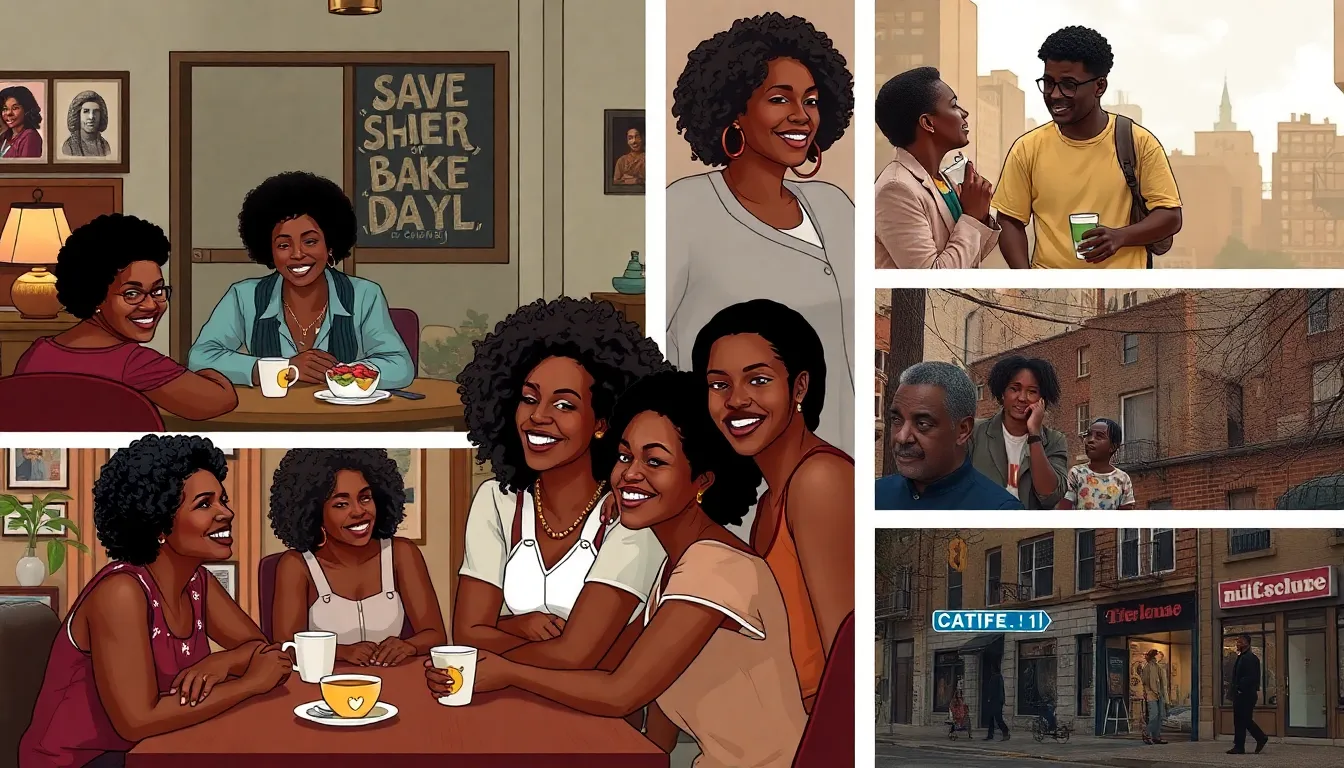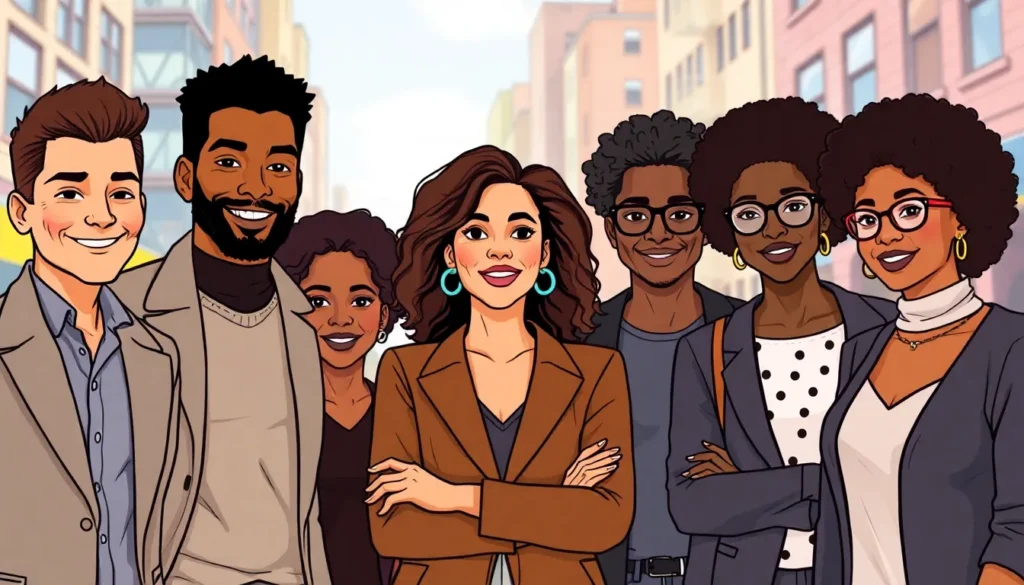The 2000s were a golden era for black television shows, blending humor, heart, and cultural commentary like never before. From laugh-out-loud sitcoms to gripping dramas, these shows didn’t just entertain—they shaped conversations and broke down barriers. Who could forget the unforgettable characters and iconic catchphrases that still echo in pop culture today?
As audiences tuned in, they found relatable stories that resonated across generations. Whether it was the family dynamics of “The Fresh Prince of Bel-Air” or the fierce friendships in “Girlfriends,” these shows created a vibrant tapestry of black life that was both hilarious and poignant. Dive into this nostalgic journey and discover how these beloved series not only made us laugh but also sparked important conversations that continue to matter.
Overview Of Black TV Shows In The 2000s
Black television shows in the 2000s significantly influenced the landscape of entertainment. Series such as “The Boondocks” and “Everybody Hates Chris” addressed critical social issues through humor and satire. Characters resonated with audiences, illustrating the diversity and complexity of black experiences.
Cinematic storytelling approached various themes, from family dynamics to community challenges. “The Game” explored professional sports alongside personal dilemmas, while “Lincoln Heights” showcased the realities of urban living. These narratives fostered connections with viewers and encouraged discussions around identity and resilience.
Prominent shows offered a platform for new talent in the industry. “The Bernie Mac Show” and “My Wife and Kids” featured established actors while introducing emerging stars to mainstream audiences. Representation expanded as networks sought to highlight black culture authentically.
Comedy led the way, but drama also left a profound impact. “Soul Food” provided insight into family bonds and traditions, while “The Wire” examined deep societal issues in Baltimore. Each show contributed to creating a richer understanding of black life and culture.
Viewers embraced these shows for their relatability and the reflections of their own lives. Multi-layered storylines encouraged audiences to engage with complex characters. Ultimately, black television in the 2000s marked a pivotal era, challenging stereotypes and showcasing a myriad of voices.
Notable Shows That Defined The Era

The 2000s featured a bold assortment of black television shows that left indelible marks on the cultural landscape. From comedies that made audiences laugh to dramas that sparked crucial conversations, these programs shaped the viewing experience.
Sitcoms That Captured Our Hearts
Popular sitcoms like “The Bernie Mac Show” and “My Wife and Kids” delivered relatable family dynamics and humor. Character-driven stories connected viewers to characters facing everyday challenges. “Girlfriends” explored friendships among black women, showcasing diverse narratives through its ensemble cast. Each series combined humor with introspective moments, creating engaging content for audiences of all backgrounds. Through humor and honesty, these shows resonated with fans and helped redefine representation in television.
Dramas That Addressed Social Issues
Dramas such as “The Wire” and “Soul Food” tackled difficult themes, providing critical social commentary. Realistic portrayals of urban life and systemic struggles highlighted the complexities of black experiences. “Lincoln Heights” focused on family and community issues, emphasizing resilience in the face of adversity. Humor and satire in “Everybody Hates Chris” highlighted childhood challenges while addressing broader societal issues. These impactful dramas not only entertained but also inspired discussions about race, identity, and community.
Impact On Culture And Representation
Black television shows from the 2000s significantly influenced culture and representation, breaking ground in various ways.
Breaking Stereotypes
These programs challenged existing stereotypes about black individuals and families. Characters portrayed in shows like “The Fresh Prince of Bel-Air” and “Girlfriends” displayed complexity, moving beyond one-dimensional roles. Humor served as a tool to address serious societal issues, making them relatable to broader audiences. Comedies revealed family dynamics and friendships, demonstrating the vibrant aspects of black life. Dramatic series, such as “The Wire,” presented raw portrayals of urban struggles and resilience. These narratives reshaped public perceptions, paving the way for more diverse storytelling.
Influencing Future Generations
Black television shows left a lasting legacy for future generations. They inspired younger audiences to pursue careers in entertainment, motivating individuals to create authentic representations. Programs like “The Boondocks” and “Soul Food” introduced critical dialogues around race and identity, fostering a sense of pride in cultural heritage. Many aspiring writers and actors cite these shows as key influences in their work. The success of these series highlighted the importance of representation, encouraging networks to invest in diverse voices. Hence, black television in the 2000s played a crucial role in shaping the landscape of contemporary media.
Memorable Characters And Performances
Black television shows in the 2000s introduced characters that resonated with audiences. These characters brought humor, depth, and authenticity to their stories.
Iconic Characters We Loved
“Will Smith” from “The Fresh Prince of Bel-Air” became a cultural icon, showcasing charm and vulnerability. “Maxine Shaw” of “Living Single” represented the independent black woman, blending wit with strength. “Chris” from “Everybody Hates Chris” provided a relatable lens on adolescence and family dynamics. “Tia” and “Tamera” in “Sister, Sister” captured twin sisterhood’s joys and challenges. “Brandy” in “Moesha” navigated teenage life while addressing issues relevant to her community. These characters helped shape cultural identity and fostered connections with viewers.
Standout Performances By Actors
“Bernie Mac” commanded attention in “The Bernie Mac Show,” delivering humor infused with heart. “Tracee Ellis Ross” brought authenticity to “Girlfriends,” portraying the complexities of friendship and ambition. “Sanaa Lathan” showcased her range in “Nappily Ever After,” tackling themes of self-acceptance and beauty standards. “Idris Elba” captivated audiences in “The Wire,” embodying the multifaceted realities of urban life. “Tyler James Williams” drew empathy in “Everybody Hates Chris,” connecting deeply with viewers through his portrayal. Each performance left a mark on television, enriching the landscape of black storytelling.
Conclusion
The legacy of black television shows in the 2000s remains influential and transformative. These series not only entertained but also sparked vital conversations about culture and identity. Through humor and drama, they captured the complexities of black life and challenged societal norms.
The characters and stories from this era continue to resonate with audiences today, inspiring new generations of creators and viewers alike. As the industry evolves, the impact of these shows serves as a reminder of the importance of representation and the power of diverse storytelling. The 2000s were truly a landmark decade that reshaped the television landscape and enriched the cultural narrative.

